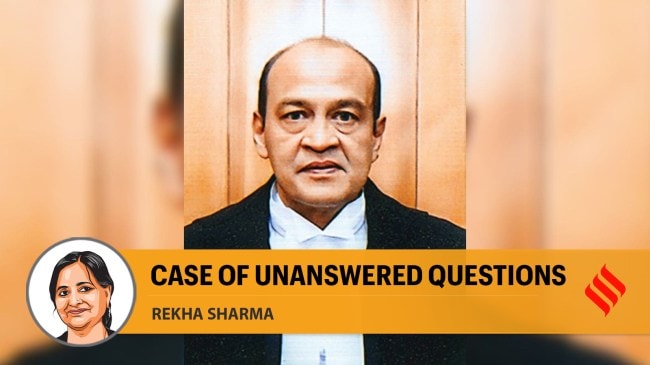Opinion The unanswered questions in Justice Yashwant Varma episode
Not just integrity of judge, but also conduct of investigating agency, is under scanner
 Justice Yashwant Varma (www.allahabadhighcourt.in via PTI Photo)
Justice Yashwant Varma (www.allahabadhighcourt.in via PTI Photo) While the fire that broke out in Justice Yashwant Varma’s house on the intervening night of March 14 and 15 was put out, the heat from the incident has been felt by the whole country. The main character is Justice Varma, a then-sitting judge of the Delhi High Court. The Chief Justice of India and members of the Collegium, too, entered the scene but at a later stage.
The judge was out of Delhi when the incident took place. The fire broke out not in the main residence of his bungalow but in a storeroom adjacent to the guard room. The fire brigade reached the spot, extinguished the fire, and within its embers found currency notes, some half burnt, some in flames. There is speculation that the amount was close to Rs 15 crore. In the meantime, police also reached the scene. The whole incident could have been brushed under the carpet, but a video recording by the police made this difficult. Before the matter could be hushed up, the fire and the currency notes were reported. The news spread like wildfire.
As expected, the matter reached the CJI. Soon came the news that the CJI and the Supreme Court Collegium had reportedly transferred Justice Varma back to the Allahabad High Court. The moment this news became public, the ever-vigilant members of the Allahabad High Court Bar Association started protesting. They did not want the judge back; they said, “We are not a trash bin.”
After the protests, the Supreme Court issued a clarification, stating that misinformation was being spread and that the transfer proposal was separate from the “in-house enquiry” into the incident. The Bar, however, did not relent. It went on strike and claimed that it has the support of many other bar associations.
The Supreme Court has since uploaded, on its website, an in-house enquiry report submitted to the CJI by the Chief Justice of the Delhi High Court, as also the photos and videos of the currency notes allegedly found. Acting on the same, the CJI has constituted a three-member committee to conduct an enquiry and asked the Delhi High Court Chief Justice not to assign any judicial work to Justice Varma.
Justice Varma has labelled the allegations against him preposterous. He has since been transferred back to the Allahabad HC.
Justice Varma has alleged that there is a conspiracy to malign and frame him and that no currency notes were ever placed in the storeroom by him or his family members. The committee constituted by the Supreme Court, of course, will go into all aspects of the incident, but some questions do arise. Where are those burnt currency notes? Was any “recovery memo” prepared? If so, who are the witnesses? Was a copy of that “memo” given to the judge’s family? Were those proceedings also videographed? If so, where is that record? If the storeroom was locked, who supplied the key? Has the lock been taken as part of evidence, and was any memo prepared in that regard? Did Justice Varma get a complaint lodged with the police regarding the alleged conspiracy and recovery of the currency notes?
Francis Bacon, in his essay ‘Of Judicature’, wrote, “Judges ought to be more learned than witty, more revered than plausible, more advised than confident. Above all things, integrity is their portion and proper virtue.” In this case, it is not only the integrity of the judge but the also conduct of the investigating agency, that is under the scanner. It is hoped that the committee will remain unruffled by opinions already expressed one way or the other.
Let us remember what Emile Zola said: “When truth is buried underground, it chokes, it gathers such an explosive force that on the day it bursts out, it blows everything with it.”
The incident has provided an opportunity to the political forces who were and still are opposed to the collegium system. The latter divests the government of a dominant role in the appointment of judges. These forces are now pleading for the restoration of the old system, which gave the government unrestricted power over appointments.
The writer is a former judge of the Delhi High Court






